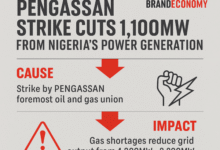Nigeria Partners World Bank to Drive Youth Employment Agenda

Nigeria has embarked on a strategic collaboration with the World Bank to craft a comprehensive job-creation agenda aimed at securing a sustainable future for its booming youth population, the Minister of Finance and Coordinating Minister of the Economy, Mr. Wale Edun, announced on Friday.
Speaking after the World Bank Development Committee plenary, held on the sidelines of the 2025 Spring Meetings in Washington D.C., Edun stressed that the country’s partnership with the multilateral institution is focused on generating quality jobs and enhancing economic opportunities domestically — a critical element in achieving President Bola Tinubu’s broader economic reform agenda.
“The focus is on setting a new direction for the World Bank and its member countries — to prioritize job creation and economic security, especially for Africa’s youth,” Edun told reporters. “A stable macroeconomic environment and financial security are essential to support this mission.”
Africa’s demographic dynamics were at the heart of the discussions, with projections indicating that by 2050, 25% of the world’s youth will reside on the continent. Nigeria, Africa’s most populous nation, is poised to either capitalize on this demographic dividend or face deeper social and economic challenges if youth unemployment persists.
Edun emphasized that Nigeria’s economic blueprint, aligned with the committee’s resolutions, aims to attract private sector investments that can create meaningful, well-paying domestic jobs — as opposed to low-value, outsourced roles — thereby reducing the mounting pressures driving skilled young Nigerians abroad in search of better opportunities.
Aviation’s Role: Connecting Youth to Global Opportunities
The Minister’s emphasis on investing in critical infrastructure — especially digital infrastructure such as broadband, fibre optics, and data networks — is particularly significant for Nigeria’s growing sectors like technology, services, and aviation.
With national carriers like Air Peace expanding regional and international routes, including new direct flights to London, Joburg, and planned North American destinations, the aviation sector is becoming an essential bridge linking Nigeria’s talent pool to global commerce. Enhanced connectivity not only opens new job markets but also stimulates tourism, trade, and related service industries that can absorb young workers into the formal economy.
A strong, youth-driven workforce, enabled by world-class infrastructure, will be key to supporting the aviation sector’s growth — from airport operations to logistics, maintenance, hospitality, and beyond.
A Bigger Play for Investors
For investors, Nigeria’s renewed emphasis on job creation, economic stability, and infrastructure modernization signals an important shift. The Tinubu administration is pushing to restore confidence in Nigeria as a viable destination for foreign direct investment (FDI), even as it battles inflationary pressures and works to stabilize the naira.
Edun’s remarks underline the importance of private-public partnerships (PPPs) in realizing this agenda. Strategic sectors like renewable energy, agriculture, fintech, and aviation are likely to benefit from increased government and multilateral support — opening new frontiers for growth-oriented investments.
“The objective is clear,” Edun said. “Create jobs locally, empower youth, and support this transformation through essential infrastructure.”
The job-creation agenda, when fully deployed, could mark a significant turning point for Nigeria’s economy — enabling a future where the country’s youth not only find opportunities at home but also become competitive players in the global market.











